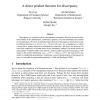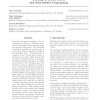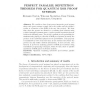5 search results - page 1 / 1 » Product theorems via semidefinite programming |
CORR
2008
Springer
13 years 4 months ago
2008
Springer
The tendency of semidefinite programs to compose perfectly under product has been exploited many times in complexity theory: for example, by Lov
COCO
2008
Springer
13 years 6 months ago
2008
Springer
Discrepancy is a versatile bound in communication complexity which can be used to show lower bounds in the distributional, randomized, quantum, and even unbounded error models of ...
ICML
2002
IEEE
14 years 5 months ago
2002
IEEE
Kernel-based learning algorithms work by embedding the data into a Euclidean space, and then searching for linear relations among the embedded data points. The embedding is perfor...
COCO
2007
Springer
13 years 10 months ago
2007
Springer
We consider a class of two-prover interactive proof systems where each prover returns a single bit to the verifier and the verifier’s verdict is a function of the XOR of the tw...
STOC
2006
ACM
14 years 4 months ago
2006
ACM
We consider the problem of bounded-error quantum state identification: given either state 0 or state 1, we are required to output `0', `1' or `?' ("don't ...



